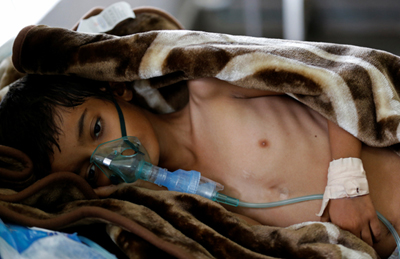| « The Charade of Russian US Election Hacking | Macron: Neoliberal Reactionary, Dangerous Psychopath » |
Cholera Hits Yemen
Stephen Lendman
During conflict-free times, Yemenis are the region’s poorest people, struggling daily to get by.
Since Bush/Cheney launched drone war on the country, continued by Obama and Trump, hugely exacerbated by US/Saudi terror war and blockade, a humanitarian catastrophe unequaled anywhere else exists, potentially millions of Yemenis at risk of perishing if things aren’t resolved.
And now cholera, according to the World Health Organization (WHO). It’s an infection of the small intestine, caused by contaminated food or water.
Symptoms include uncontrolled watery diarrhea, vomiting, dehydration, rapid heart rate, and abdominal cramps, among others. Untreated severe cases can cause death.
In recent weeks according to the WHO, at least dozens of Yemenis perished from the disease. Over 2,700 suspected cases occurred - perhaps many more cholera-related deaths and illnesses than known or officially reported.
Terror-bombing, including on hospitals and medical clinics, as well as blockade prevents the availability of medical supplies, equipment and proper treatment for countless numbers of ill, injured, malnourished and starving Yemenis.
The WHO said it’s “distribut(ing) medicines and medical supplies, including cholera kits, oral rehydration solutions and intravenous (IV) fluids as well as medical furniture and equipment for diarrhoea treatment centres.”
“Ten new treatment centres are being established in affected areas. WHO is also supporting health authorities to establish oral rehydration therapy corners to treat mild and moderate dehydration due to diarrhoea.”
“Starting with 10 oral rehydration therapy corners in Sana’a, this approach will be replicated across all affected areas. More severe cases will be referred to the diarrhea treatment centres.”
Given daily Saudi terror-bombing and blockade, preventing enough food from reaching starving people, it’s unclear how effective WHO efforts can be, especially for a severely malnourished population, more vulnerable illness and disease.
Millions of Yemenis have poor or no access to medical treatment, unknown numbers likely perishing from various undiagnosed diseases and wounds sustained from war-related violence.
Yemen’s healthcare system is weak and inadequate. In many areas, proper sanitation is nonexistent. Pathogens causing cholera spread more easily in warm, rainy weather.
Last October, Yemen’s Ministry of Public Health and Population announced the cholera outbreak. The WHO estimates around 7.6 million people live in areas with high risk of the disease’s occurrence and transmission.
According to its representative in Yemen Dr. Nevio Zagaria, “(w)e are very concerned with the re-emergence of cholera across several areas of Yemen in the past couple of weeks. Efforts must be scaled-up now to contain the outbreak and avoid a dramatic increase in cases of diarrhoeal disease.”
“WHO is in full emergency mode to contain the recent upsurge of suspected cholera cases. Containing the spread of the outbreak is a high priority for WHO, and we are coordinating efforts with all parties and with our health, water and sanitation partners to scale up an integrated and effective response to the cholera epidemic.”
Containing the outbreak is more a political than medical issue. As long as war and blockade continue, the ability to provide healthcare will be severely limited - largely unavailable for millions of Yemenis.
-###-
Stephen Lendman lives in Chicago. He can be reached at lendmanstephen@sbcglobal.net.
His new book as editor and contributor is titled "Flashpoint in Ukraine: How the US Drive for Hegemony Risks WW III."
http://www.claritypress.com/LendmanIII.html
Visit his blog site at http://www.sjlendman.blogspot.com.



